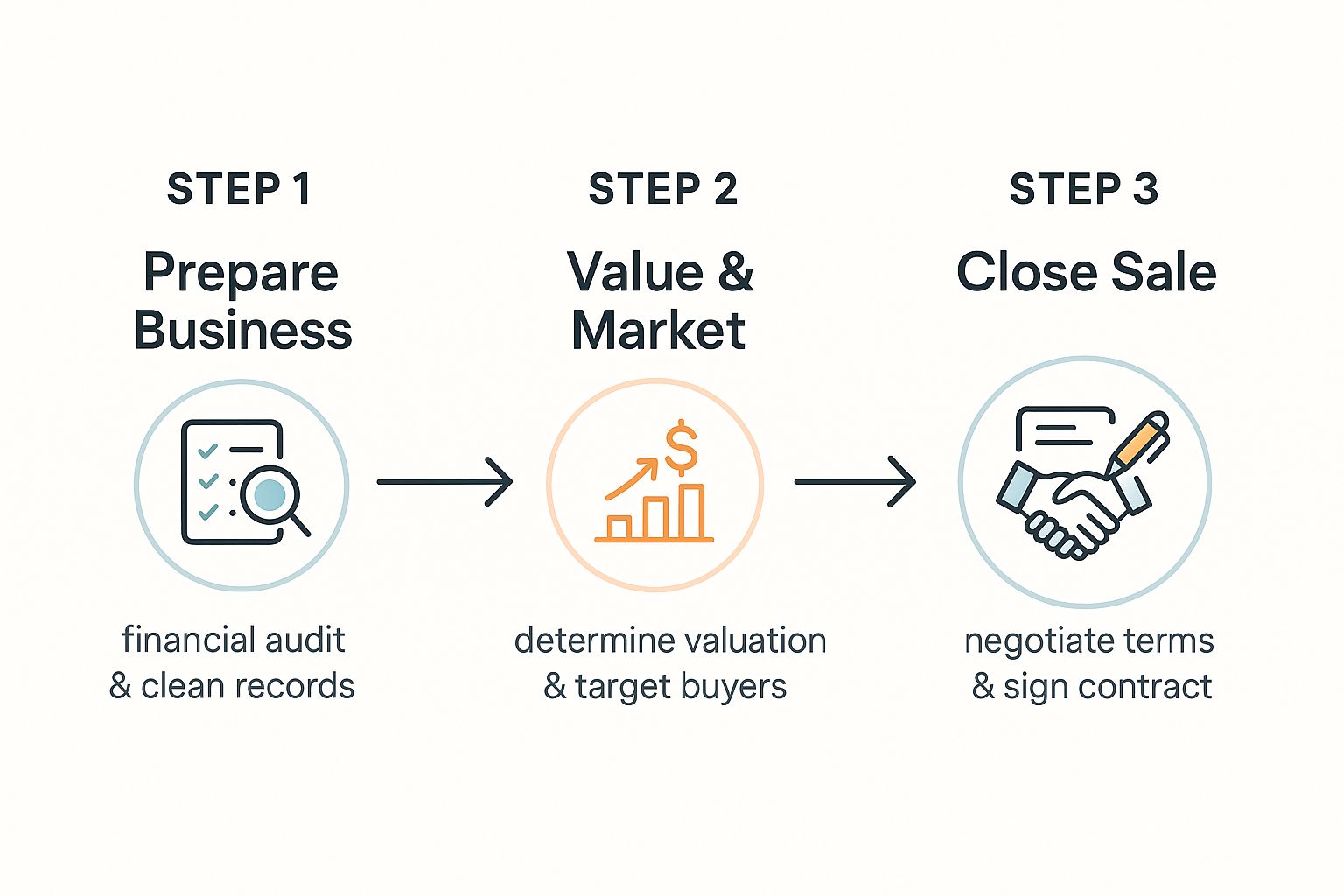Selling your business is a monumental journey, and the path to a successful exit begins long before you even consider listing it. A smart sale is a process of careful preparation, valuation, marketing, and negotiation. All told, you can expect the entire transaction—from the initial planning stages of how to sell a business to closing the deal—to take somewhere between 6 to 12 months.
Your First Steps to a Successful Business Sale
Selling your business is the final, defining chapter of your entrepreneurial story. It’s the culmination of countless hours, immense effort, and significant personal investment. To ensure this final chapter is a profitable one, a structured and thoughtful approach is essential.
Before you even think about the specifics of the sale itself, the real work begins with developing a smart business exit strategy. This is your foundational step. It forces you to clarify your personal and financial goals, which will guide every single decision you make from here on out.
This isn’t just about finding a buyer. It's about methodically transforming your company from a founder-led operation into an attractive, turnkey asset that someone else can step into. That requires a deep dive into your financials, operations, and legal standing.
The Emotional and Financial Readiness Check
Before taking any concrete steps, you need to do a serious gut check. Selling a business is as much an emotional journey as it is a financial one. You've likely poured your identity into your company, and letting go can be surprisingly difficult. It’s critical to be mentally prepared for the demanding process ahead and to have a clear vision for your life after the sale.
On the financial side of things, knowing what you need from the sale is paramount. This is where professional guidance can make all the difference, helping you align the sale price with your long-term wealth goals. To navigate this complex financial landscape, you'll want the right support.
A successful sale is rarely a spontaneous event. It's the result of meticulous planning that often starts years in advance. Owners who prepare their business for a sale from day one are always in the best position to maximize its value when the time comes to exit.
Breaking Down the Sale Process
To make this whole journey manageable, it helps to view it in distinct phases. Each stage has a clear objective and builds on the last, creating a smooth and effective transaction. The infographic below simplifies the core workflow, from getting your house in order to finally closing the deal.

This visual roadmap drives home a key point: a strong foundation of clean financials and organized operations is the launchpad for an effective valuation and marketing campaign, which ultimately leads to a successful close.
To give you a clearer picture, here’s a quick breakdown of what you can expect at each stage of the process.
The Business Sale Process at a Glance
Each timeline is an estimate, of course. A well-prepared business will almost always move through these stages more quickly and with fewer hiccups.
Getting Your Business Ready for a Profitable Sale

Before you even think about listing your business, you need to shift your mindset. You're no longer just running your company; you're preparing a product for the market. This prep phase is easily the most important part of the entire process.
It’s all about transforming your business into a desirable, turnkey asset that can withstand the intense scrutiny of due diligence—and actually impress savvy buyers. Think of it like staging a house. You clean up, sure, but you also strategically highlight its best features and fix any potential issues before they can derail a deal.
Buyers pay a premium for businesses that are transparent, efficient, and ready for a smooth transition. The work you put in now has a direct line to your final sale price and how quickly the deal gets done. A well-prepared business signals stability, reduces the buyer's perceived risk, and gives you a much stronger hand in negotiations.
Fortifying Your Financial Foundation
Your financial records are the bedrock of a successful sale. I can't stress this enough. Buyers and their lenders will comb through every line of your P&Ls, balance sheets, and cash flow statements for the last three to five years.
Messy bookkeeping or commingled personal and business expenses are the fastest way to kill a buyer's confidence and sink your valuation. Your goal is to present a clean, verifiable history of financial performance. Now is the time to sit down with your accountant and clean it all up.
You also need to know your key financial metrics inside and out. A deep understanding of your numbers is simply non-negotiable. For a detailed guide on this, check out our insights on how to analyze financial statements.
Organizing Your Legal and Contractual House
A buyer isn't just buying your inventory and customer list; they're inheriting your legal obligations. A jumble of disorganized contracts creates uncertainty and can seriously complicate the transfer of ownership.
Start now by gathering all essential paperwork into a secure digital folder, often called a data room. This should include:
- Corporate Documents: Your articles of incorporation, bylaws, and any board meeting minutes.
- Key Contracts: Agreements with your most important customers, suppliers, and vendors. Look closely for any "change of control" clauses.
- Leases: All agreements for property and major equipment.
- Intellectual Property: All the paperwork for trademarks, patents, and domain names.
- Employee Info: Employment agreements and an anonymized list of your team with their roles, tenure, and pay.
It’s also critical to resolve any pending lawsuits or legal disputes before going to market. These issues are major red flags for buyers, representing unknown liabilities that can stop a deal in its tracks.
A business that can present a complete, organized set of legal documents demonstrates foresight and operational maturity. It tells a buyer that the company is well-managed and that the due diligence process will be straightforward, not an archeological dig.
Streamlining Operations for a Seamless Transition
A potential buyer’s biggest question will be, "Can this business run without the current owner?" The answer has to be a confident "yes."
To prove it, you need to systematize your operations and reduce your personal involvement in the day-to-day grind. This means creating detailed Standard Operating Procedures (SOPs) for every key function in the business—from how you generate leads to how you handle customer service.
SOPs show a buyer that your company's success is built on proven processes, not just your individual hustle. For example, a marketing SOP might detail your lead generation and nurturing process, step-by-step. These documents turn your know-how into tangible, transferable assets. They add immense value and de-risk the acquisition for a new owner, proving your business is a well-oiled machine ready for new leadership.
Accurately Determining Your Business Valuation

Once your books are clean and your operations are running smoothly, you hit the million-dollar question every owner has to ask: "What is my business actually worth?"
Getting this wrong can be a costly mistake. If you aim too high, serious buyers won't even give you a second look. Price it too low, and you're leaving a huge chunk of your hard-earned equity on the table. It’s a delicate balance.
Figuring out the right number is part art, part science. It’s not just about your past profits; it’s about crafting a financial story that justifies your price and gives a buyer the confidence to invest. This is where all your prep work—the clean books, the streamlined processes—starts to pay off in a very real way.
Common Business Valuation Methods
There’s no single, magical formula for valuing a business. Instead, pros use a few different methods to land on a realistic price range. Getting a handle on these will put you in a much stronger position when you talk to advisors, brokers, and potential buyers.
Here are the three main approaches you should know:
- Seller's Discretionary Earnings (SDE) Multiple: This is the go-to method for most small and mid-sized businesses. You start with your net profit and add back things like your own salary, benefits, and other non-essential business expenses. That final SDE number is then multiplied by a figure based on your industry, business size, and risk profile—usually somewhere between 2x to 5x.
- Asset-Based Valuation: This one is pretty straightforward. You calculate the total value of your company's assets (cash, equipment, inventory) and then subtract all its liabilities. It’s often used as a baseline price for any business or for companies where tangible assets are the main event, like in manufacturing.
- Discounted Cash Flow (DCF): This is a more complex model you’ll see with larger or high-growth companies. It’s all about future potential. DCF projects a company's future cash flows over several years and then discounts them back to what they're worth today.
Valuing Your Intangible Assets
Often, what makes a business truly valuable isn't something you can see on a balance sheet. These are your intangible assets—the non-physical things that drive your success—and they can add a ton of value. Forgetting them is a rookie mistake.
Think about your favorite local coffee shop. The tangible stuff is the espresso machine and the tables. But its intangible assets are its fantastic reputation, the regulars who come in every single day, and that prime corner location. That's what a buyer is really paying a premium for.
Valuing a business is not just an accounting exercise; it's about quantifying the future. A strong brand, loyal customers, and proprietary processes are promises of future revenue, and you must get credit for them in your sale price.
So, how do you put a number on these things? Start by asking:
- Brand Reputation: How much would a competitor need to spend on marketing to get the same name recognition you have?
- Customer Lists: What’s the lifetime value of your average customer? How reliable is that recurring revenue stream?
- Proprietary Technology or Processes: Do you have a unique system or software that gives you a real competitive advantage, like better margins or efficiency?
The Critical Role of a Third-Party Valuation
Even with a good grasp of these methods, trying to value your own business is tough. You're just too close to it, and your bias is bound to creep in. That’s why getting a professional, third-party valuation is one of the smartest investments you can make during the sale process.
An independent appraiser gives you an objective, data-backed assessment of your company's worth. This report becomes a powerful tool in negotiations, turning your asking price from an "I think" into an "I know." It gives you the confidence to hold firm on your price and gives buyers (and their lenders) the proof they need.
For some businesses, especially those with equity compensation plans, a specialized report is non-negotiable. It's worth exploring what a 409A valuation entails to see why it's an industry standard. This kind of professional documentation signals to buyers that you're serious and transparent, which can speed up due diligence and build trust right from the start.
Finding the Right Buyer for Your Business
Okay, you’ve done the hard prep work. Your business is dialed in, you have a solid valuation in hand, and now it’s time for the main event: finding the person or company who will write the check. This is where your strategy shifts from operations to salesmanship.
Let's be clear: selling a business isn't just about finding someone with deep pockets. You’re looking for the right steward for what you’ve built. This isn’t just a transaction; it’s about your legacy.
The search requires a targeted, almost surgical approach. The world is full of potential buyers, but they all have different motivations, financial horsepower, and visions for your company. Getting to know these buyer profiles from the get-go is the secret to creating a marketing plan that actually works and pulls in the best candidates.
Understanding Different Buyer Profiles
You wouldn't use the same sales pitch on everyone, and the same logic applies here. A conversation with a massive corporation will feel completely different from a chat with a first-time entrepreneur. Knowing who you're talking to lets you tailor your message and highlight what they truly care about.
Most buyers fall into one of three camps:
- Strategic Buyers: Think of these as competitors or other big players in your industry. They're on the hunt for synergies—your customer list, your tech, your market share—something that helps them grow faster than they could on their own. Because your business is worth more to them than it is on its own, they often pay the highest price.
- Financial Buyers: This bucket includes private equity groups and investment firms. For them, it's all about the numbers, specifically the return on investment (ROI). They want stable, profitable businesses with great cash flow and a clear path to growth. Their plan is usually to hold the business for 3-5 years, grow it, and then sell it for a profit.
- Individual Buyers: This could be anyone from a former corporate exec looking for their next chapter to a family member. They are essentially buying themselves a job and a lifestyle. Their main concern is profitability from day one and how easily they can step into your shoes.
Crafting a Compelling Sales Narrative
To get these buyers to the table, you need a killer marketing document. It’s called the Confidential Information Memorandum (CIM), or sometimes the "deal book." Think of it as the ultimate professional resume for your business.
This isn't a short brochure. A good CIM is a comprehensive story, often 25-50 pages long, that details where your business came from, its current health, and all the untapped potential a new owner could unlock.
A great CIM does more than list facts and figures. It weaves a narrative that gets buyers excited about the future. It shows them the growth opportunities they can seize, justifying your asking price and making them eager to learn more.
Naturally, this document is top-secret. It's only shared after a prospective buyer has signed a Non-Disclosure Agreement (NDA). It needs to be professional, persuasive, and packed with enough detail for a serious buyer to make a confident next step.
The Modern Buyer Decision Process
Selling a business today means understanding how buyers think and operate now. They're savvier and do more homework on their own than ever before. Recent B2B sales data shows that, on average, there are 7.4 decision-makers involved in a single purchase.
What’s more, buyers are doing nearly 70% of their research independently before they ever even speak to a seller. This means you have to be ready with transparent, detailed, and easily accessible information from the very beginning. If you want to dive deeper, you can discover more sales process insights that highlight these modern buyer behaviors.
Choosing Your Path: Business Broker vs. Private Sale
One of the biggest forks in the road is deciding whether to hire a business broker or go it alone. There's no single right answer, and each path has its pros and cons.
Using a Business Broker:
A good broker brings a ton to the table: expertise, a network of vetted buyers, and an objective third-party perspective. They run the marketing, weed out the tire-kickers, and handle the nitty-gritty of negotiations. This frees you up to do what you do best—run your business. Yes, they charge a fee (usually a percentage of the sale price), but they often make it back and then some by securing a higher price and navigating deals you might not have been able to close yourself.
Conducting a Private Sale:
Going the "For Sale By Owner" (FSBO) route means you get to keep the broker's commission. This can work well if you already have a buyer in mind, like a manager who wants to take over or a family member. Be warned, though: it's a massive time commitment. You'll be responsible for everything—valuation, marketing, legal wrangling—and keeping the sale confidential while you're still running the show can be incredibly tricky.
Navigating Due Diligence and Closing the Deal

You’ve done the hard work of preparing your business, you have a solid valuation in hand, and you’ve even attracted a serious buyer. Now comes the moment of truth: the final, most demanding phases of the sale. This is where deals are made—or completely fall apart.
It really kicks off once a buyer submits a Letter of Intent (LOI). Think of the LOI as a non-binding handshake agreement that lays out the proposed price, terms, and conditions. This is your first real chance to shape the deal to fit your financial goals, so don’t take it lightly.
This stage is a delicate dance of offers and counteroffers. Don't be afraid to push back on terms that don't sit right with you, but remember to always negotiate in good faith. A great negotiation isn't about winning every single point; it's about finding that middle ground where both you and the buyer walk away feeling like you got a fair deal.
Surviving the Due Diligence Gauntlet
Once the LOI is signed, the buyer will kick off the due diligence process. Brace yourself. This is an exhaustive, top-to-bottom investigation of every single aspect of your business. The buyer and their team of accountants and lawyers are about to put your company under a microscope to verify that everything you've claimed is accurate.
Their goal is to uncover any hidden risks or liabilities before they write the check. Your goal is to be transparent, responsive, and incredibly organized. Any hesitation or messiness on your part can create suspicion and potentially kill the whole transaction. All that prep work you did at the beginning? It’s about to pay off in a big way right here.
To keep things moving smoothly and securely, it is highly recommended you start setting up a business data room. It’s basically a secure online library where you can share sensitive files with the buyer’s team in a controlled, professional way.
The Due Diligence Checklist
While every deal has its own quirks, buyers almost always ask for a standard set of documents. Having these ready to go will make you look like a pro and dramatically speed things up. Here’s what you should have on hand:
- Financial Records: At least three to five years of financial statements (audited or reviewed is best), tax returns, detailed sales records, and reports on accounts receivable and payable.
- Legal Documents: Your articles of incorporation, business licenses, permits, and any documentation of past or pending lawsuits.
- Customer Information: Anonymized lists of your top customers, sales concentration reports, and copies of major client contracts.
- Employee and HR Info: A roster of employees with their roles, tenure, and pay, plus copies of employment agreements and benefit plan details.
- Contracts and Agreements: All key contracts with suppliers, vendors, equipment and property leases, and any IP agreements like patents or trademarks.
Due diligence is the ultimate stress test for your business—and your preparedness. A smooth, transparent process builds immense trust with the buyer and solidifies their confidence, making those final steps toward closing so much easier.
Crossing the Finish Line: The Closing Process
After the buyer has finished their digging and is satisfied with what they've found, your respective legal teams will get to work drafting the definitive purchase agreement. This is the big one—the legally binding contract that finalizes every term of the sale, from the price and payment structure to all the representations and warranties.
Go over this document with your attorney with a fine-tooth comb. Seriously, read every line. Once it’s signed, there's no turning back. The final step is the closing day itself, where the last documents are signed, funds are wired to your account, and you officially hand over the keys.
Closing the sale is the culmination of months, if not years, of your hard work. It's the moment your entrepreneurial journey reaches its successful conclusion. By staying organized and leaning on your team of advisors, you can ensure a smooth, legally sound transition and step confidently into whatever comes next.
Answering Your Questions on How to Sell a Business
Selling a business is a huge milestone, and it’s only natural to have a ton of questions swirling around. Most owners I talk to are facing the same uncertainties: How long will this really take? What are the biggest mistakes I could make? Do I actually need professional help?
Getting straight answers to these common questions is the first step toward moving forward with confidence. Let's tackle them one by one.
How Long Does It Actually Take to Sell a Business?
There's no one-size-fits-all answer, but you should realistically plan for the entire process to take 6 to 12 months. It’s not a single transaction but a series of distinct phases, each with its own rhythm.
Think of it this way:
- Prep & Valuation (1-3 months): This is your time to get the financial house in order. You'll be cleaning up your books, organizing documents, and working with an advisor to land on a solid, defensible asking price.
- Marketing & Buyer Search (3-6 months): Next, you go to market. This involves creating the marketing package, confidentially reaching out to potential buyers, and filtering through the noise to find qualified, serious leads. This part often takes the longest.
- Negotiation & Due Diligence (2-4 months): Once you’ve got a serious offer on the table, the real work begins. You'll negotiate the key terms and then brace yourself for the buyer’s deep dive into every corner of your business.
Of course, things like the health of your industry, the general economy, and—most importantly—how well-prepared you are can speed things up or slow them down. Solid prep work on the front end is the single best way to keep the process moving.
What Are the Biggest Mistakes to Avoid When Selling?
I've seen many good deals fall apart because of unforced errors. Just being aware of these common traps is half the battle.
Here are the pitfalls that trip up sellers most often:
- An Unrealistic Price Tag: Overpricing your business is the fastest way to kill a deal before it even starts. Serious buyers know the market, and they won't even engage if your number is pure fantasy.
- Sloppy Preparation: Nothing screams "risk" to a buyer like disorganized financials, unresolved legal spats, or chaotic daily operations. It makes them wonder what other problems are hiding under the surface.
- Letting the Secret Out: Confidentiality is everything. If word gets out that you're for sale, it can spook key employees, loyal customers, and even your suppliers. That instability can tank the very value you're trying to capture.
- Taking Your Eye Off the Ball: The sale process is a marathon, not a sprint. The minute you let business performance slide, you give the buyer leverage to lower their offer. You have to keep your foot on the gas until the check clears.
- Trying to Do It All Yourself: The legal and financial complexity of selling a business is staggering. Going it alone without an experienced M&A advisor, attorney, and CPA is a recipe for leaving money on the table—or worse, making a catastrophic mistake.
Do I Really Need to Hire a Business Broker?
For almost every business owner, the answer is a clear and resounding yes. While you're not legally required to hire a broker, their value almost always exceeds their commission—which, by the way, you typically only pay if the deal successfully closes.
A good broker brings an objective valuation to the table, creates professional marketing materials that attract the right kind of buyers, and taps into their private network to find people you could never reach on your own. All of this happens behind a strict wall of confidentiality.
This expert guidance frees you up to do what you do best: continue running your business at its peak.
A broker isn't just a matchmaker. They manage the entire grueling process, from marketing to tense negotiations, making sure you not only get the best price but also the right deal structure for your goals. They are the critical buffer between you and the buyer.
Sure, if you're selling a tiny business to your cousin, you might be able to manage without one. But in nearly every other scenario, their expertise is the best investment you can make in securing a smooth, profitable exit.
Navigating the complexities of a business sale requires a financial partner who understands your long-term goals. At Commons Capital, we specialize in helping business owners like you manage the proceeds of their sale to build a secure and prosperous future. To learn how we can help you transition from business ownership to financial freedom, visit us at Commons Capital.





